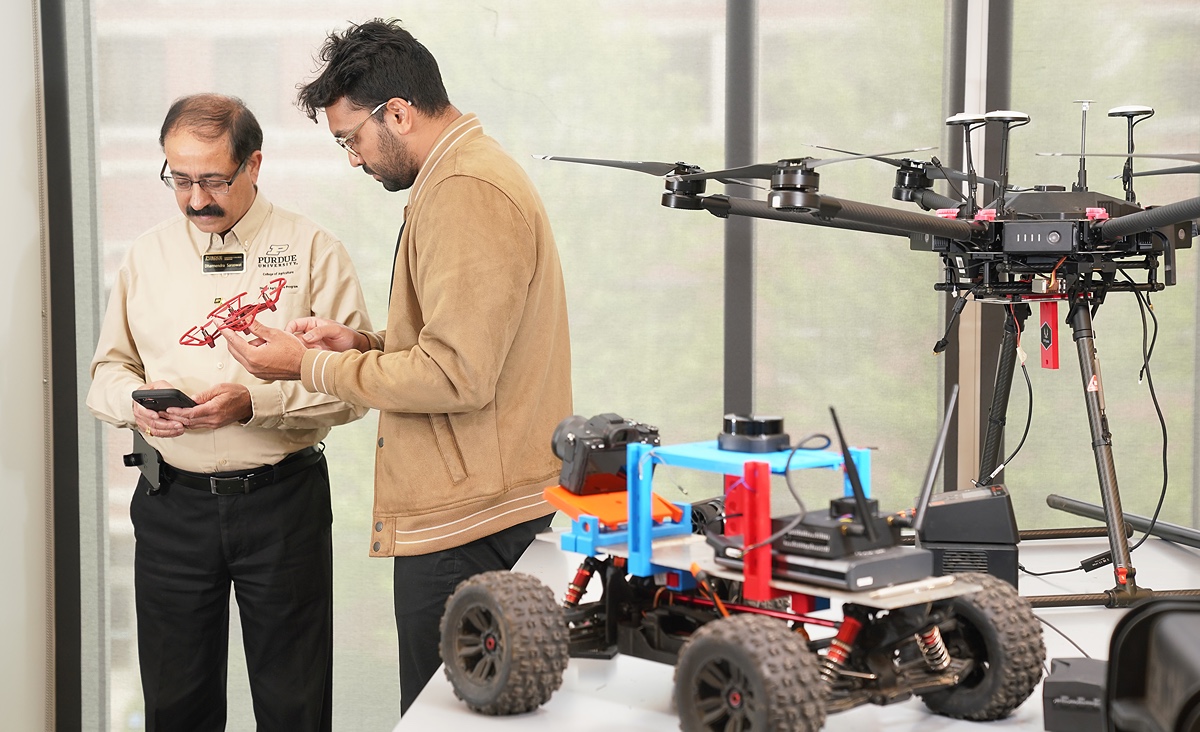The U.S. Department of State has selected Purdue University’s Dharmendra Saraswat, associate professor of agricultural and biological engineering, as a Fulbright U.S. Scholar for India in 2023-2024. Starting in November, Saraswat will spend six months at the Indian Agricultural Research Institute (IARI) in New Delhi.
Also known as the Pusa Institute, IARI is India’s premier agriculture research, teaching and extension institution. Scientists at the facility measure and analyze observable plant characteristics. Saraswat will collaborate with scientists at the IARI’s phenotyping center— India’s largest — to develop a data workflow system. Saraswat also will help his IARI colleagues with curriculum design and classroom delivery of data-science-related courses.
“ABE is proud of Dr. Saraswat for being recognized with this Fulbright award,” said Nathan Mosier, professor and head of the department of agricultural and biological engineering. “His research in digital agriculture is making a tremendous impact in Indiana and the U.S. His efforts in engaging with top universities in India will accelerate efforts to improve food production and efficiency there as well.”
Saraswat noted that some experts are beginning to describe data as the new oil. “Agriculture needs to convert data into information for making decisions. In India, there is a lot of infusion of drone technology and sensors, a plethora of data that is generated by their use could transform farming practices of small and marginal farmers there.”
The Fulbright Award will return Saraswat to his alma mater. He received his master’s degree in agricultural engineering from IARI after completing his bachelor’s degree at the Allahabad Agricultural Institute (renamed as Sam Higginbottom University of Agriculture, Technology and Sciences).
 Associate Professor of Agricultural and Biological Engineering Dharmendra Saraswat (left) and his PhD candidate, Aanis Ahmad calibrate an Unmanned Aerial Vehicle (UAV) in the Saraswat lab.
Associate Professor of Agricultural and Biological Engineering Dharmendra Saraswat (left) and his PhD candidate, Aanis Ahmad calibrate an Unmanned Aerial Vehicle (UAV) in the Saraswat lab. A former scientist at the Indian Council of Agricultural Research, he also is a former faculty member at the Chandra Shekhar Azad University of Agriculture and Technology in Kanpur, India. Saraswat has continued to work closely with agricultural engineers in India since moving to the United States more than 20 years ago.
“The USDA is emphasizing that the nation needs more agricultural graduates to be exposed to data analysis, data visualization, and converting that data to information,” Saraswat said. “India realizes the same with its policy on AI applications in agriculture. There are pronouncements by the top leadership, including the prime minister of India, similar to the U.S., that we need to develop students’ analytical problem-solving and computational decision-making skills.”
In 2020, Saraswat and colleagues at Purdue, the University of Kentucky and Tuskegee University received funding from the U.S. Department of Agriculture’s National Institute of Food and Agriculture to develop three new courses on agriculture informatics.
“I will help my colleagues in IARI to adapt what we have developed under U.S. conditions to suit their own requirements,” he said.
Saraswat also will continue his research on the plant disease forecasting system already underway in his Digital Agriculture Discovery Lab. He raised the benefits of such a system in 2020 at India’s VAIBHAV Summit to envision the nation’s scientific and technological future.
In one of his invited talks at the summit, Saraswat noted that 85% of India’s farmers hold less than two and a half acres of land, yet they still produce nearly half the nation’s rice. They face the daunting prospect that bacterial blight could destroy 70% of their yield.
“Bacterial blight is a devastating disease for rice,” he said. This led him to propose the development of an early-warning disease forecasting system for rice. “Then we could adapt it to other crops that grow in India,” he said. Included in Saraswat’s proposal at the summit, was a plan to disseminate crop-disease warnings to farmers in their many different local languages.
Back at Purdue, with a grant from the Shah Family Global Innovation Lab, Saraswat organized a two-day virtual meeting in 2021 to explore the possibility of developing an intelligent early warning system for rice crop diseases in India. Taking part in the meeting were U.S. scientists, stakeholders in the private sector and the scientists of the Indian Council of Agricultural Research. They discussed opportunities and challenges for developing an artificial intelligence-based disease forecasting system by analyzing existing weather and disease incidence data.
“There are several artificial intelligence techniques we utilize in our lab that allow us to forecast disease incidence,” Saraswat said. “We have also developed methods that can determine disease severity in a particular field.”
Saraswat’s Fulbright award will further strengthen ongoing relationships between Purdue and India’s higher education system. In 2017, Purdue entered a partnership agreement with India’s Science and Engineering Research Board (SERB), the counterpart to the U.S. National Science Foundation. The agreement facilitates doctoral fellows from leading educational institutions in India to study at Purdue for a year as part of SERB’s Overseas Visiting Doctoral Fellowship program. From 2019 to 2022, 74 doctoral fellows from 38 Indian institutions spent a year in 26 Purdue departments.
Saraswat expressed gratitude to his Purdue colleagues who encouraged and supported his Fulbright application, including Mosier, Christopher Lukasik, Provost’s Fellow for faculty Fulbright awards, Kingsly Ambrose, professor of agricultural and biological engineering and University Faculty Scholar, who served as a Fulbright Scholar in 2021-2022 at Tamil Nadu Agricultural University, Coimbatore, India, and Dennis Buckmaster, professor of agricultural and biological engineering and Dean’s Fellow for Digital Agriculture.





